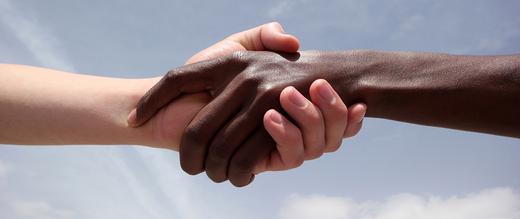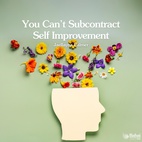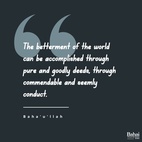The views expressed in our content reflect individual perspectives and do not represent the official views of the Baha'i Faith.
Yes or No: Every person is entitled to human rights without discrimination. If you said yes, you’re definitely in sync with the modern age.
Why? Well, that simple statement has become one of the fundamental, foundational basics of modern international law since World War II. Hundreds of years before, we had multiple constitutions and bills of rights in various nations that guaranteed equal treatment for everyone—France and the United States come to mind—but in the age of slavery and its discriminatory aftermath, their lofty promises rang pretty hollow. During those periods, even the so-called “free” nations of the global west had rampant, institutionalized racial and ethnic discrimination at their core.
Not until fairly recently has our modern age reached the conclusion—and begun to enforce it legally—that all human beings have rights, and one of those rights is freedom from discrimination. Despite this growing awareness, not everyone has developed the level of consciousness and acceptance required to accept the Baha’i principle of the elimination of prejudice.
That’s one of the reasons why the United Nations has declared March 21st as the International Day for the Elimination of Racial Discrimination; and the week of March 21-27 as the Week of Solidarity with the Peoples Struggling Against Racism and Racial Discrimination; and devoted the theme of the year 2017 to defeating Racial Profiling and Incitement to Hatred, including in the Context of Migration.
Why so much emphasis on discrimination? Because in many parts of the world, discriminatory practices are still widespread, including racial, ethnic, religious and nationality-based profiling and incitement to hatred.
Today, refugees, migrants and so-called “foreigners” have become some of the primary targets of hatred and racial profiling—as demonstrated by the recent shooting of two engineers from India, Srinivas Kuchibhotla and Alok Madasani, in Olathe, Kansas by a handgun-wielding American screaming “Get out of my country!”
Mr. Kuchibhotla died and Mr. Madasani survived. The incident may lead to hate crime charges against the gunman. Both of the victims had been educated in the United States, were legal immigrants and had done nothing to provoke the enraged shooter. If you only heard or read the headlines, you may have just shaken your head and despaired at such raw and unmitigated hatred. The New York Times reported, however, that several Americans at the scene of that terrible hate crime acted in a completely different way than the allegedly intoxicated killer did:
… Jeremy Luby, 41, a software developer, said he offered to pick up the tab for (Kuchibhotla and Madasani, before the shooting but after the gunman’s insults), who thanked him during a brief conversation about work and cultural differences.
“It was wrong what happened to them,” Mr. Luby said. “I thought it was a nice gesture to say, ‘I’m sorry someone was being rude to you like that.’”
After the shooting began, another patron, Ian Grillot, 24, said he tried to count the shots while he hid under a table. Thinking the gunman had run out of ammunition, Mr. Grillot said, he confronted him, only to be shot in the hand and the chest.
“It wasn’t right, and I didn’t want (the gunman) to potentially go after somebody else,” Mr. Grillot said in a video released by the hospital where he received treatment. “He did it once. What would stop him from doing it again?” – February 24, 2017, by John Eligon, Alan Blinder and Nida Najarfeb.
Those acts of kindness and selflessness both before and after such a heinous and hateful crime demonstrate that racial and ethnic hatred does not have to dominate our world—that we can all help promote respect, safety and dignity for everyone from every racial background, as well as all migrants, refugees and foreign-born peoples, just as the Baha’i teachings recommend:
Let not conventionality cause you to seem cold and unsympathetic when you meet strange people from other countries. Do not look at them as though you suspected them of being evil-doers, thieves and boors. You think it necessary to be very careful, not to expose yourselves to the risk of making acquaintance with such, possibly, undesirable people.
I ask you not to think only of yourselves. Be kind to the strangers, whether come they from Turkey, Japan, Persia, Russia, China or any other country in the world.
Help to make them feel at home; find out where they are staying, ask if you may render them any service; try to make their lives a little happier.
In this way, even if, sometimes, what you at first suspected should be true, still go out of your way to be kind to them — this kindness will help them to become better.
After all, why should any foreign people be treated as strangers?
… Put into practice the Teaching of Baha’u’llah, that of kindness to all nations. Do not be content with showing friendship in words alone, let your heart burn with loving kindness for all who may cross your path. – Abdu’l-Baha, Paris Talks, pp. 14-16.
In the New York Declaration for Refugees and Migrants adopted by the United Nations in September 2016, UN Member States strongly condemned the many recent ugly outbreaks of racism, racial discrimination, xenophobia and related intolerance against refugees and migrants. The member nations committed to engage in a wide spectrum of actions that counter such attitudes and behaviors, particularly regarding hate crimes, hate speech and racial violence. That same UN Summit for Refugees and Migrants in September 2016 also sparked “Together,” a United Nations initiative to promote respect, safety and dignity for refugees and migrants. “Together,” a global initiative led by the UN Secretary-General, aims to change negative perceptions and attitudes towards refugees and migrants, in partnership with Member States, civil society and the private sector.
On International Day for the Elimination of Racial Discrimination, the UN Human Rights Office asks people around the world to Stand up for Someone’s Rights Today—like those two Americans in Kansas did. When we all Stand up for Someone’s Rights, we encourage and support actions in our daily lives to defend the human rights of others—and our own.
When you see an act of hatred, prejudice or discrimination, Abdu’l-Baha said:
I charge you all that each one of you concentrate all the thoughts of your heart on love and unity. When a thought of war comes, oppose it by a stronger thought of peace. A thought of hatred must be destroyed by a more powerful thought of love. Thoughts of war bring destruction to all harmony, well-being, restfulness and content. Thoughts of love are constructive of brotherhood, peace, friendship, and happiness. – Ibid., p. 30.

















Comments
Sign in or create an account
Continue with Facebookor